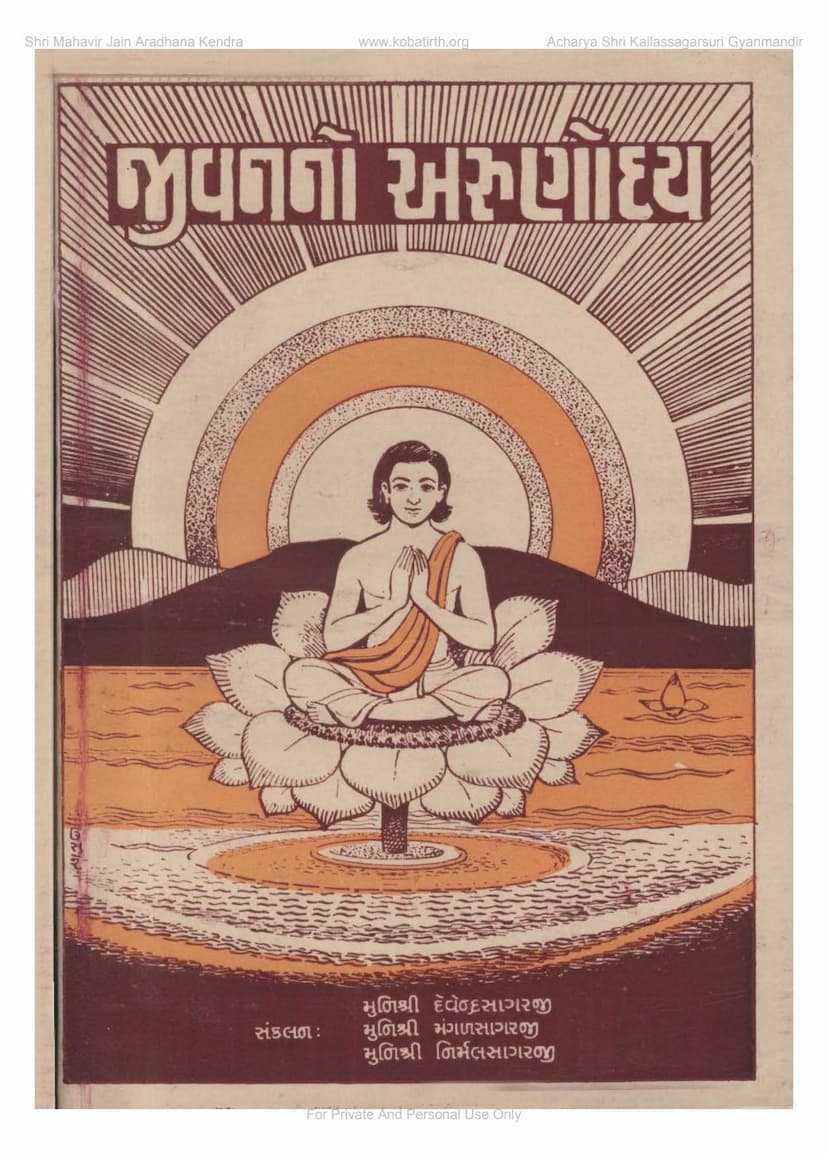Jivan No Arunoday Part 4
Added to library: September 2, 2025

Summary
Here's a comprehensive summary of the Jain text "Jivan No Arunoday Part 4":
This book, "Jivan No Arunoday Part 4" (The Dawn of Life, Part 4), is a compilation of spiritual discourses delivered by the revered Acharya Shri Padmasagarsurishwarji Maharaj Saheb. It has been compiled by Munishri Devendrasagarji, Munishri Mangalsagarji, and Munishri Nirmalsagarji, under the auspices of Shri Mahavir Jain Aradhana Kendra. The book was published by Shantilal Mohanlal Shah and Amrutlal Hiralal Shah.
The core message of the book revolves around achieving spiritual upliftment, self-realization, and ultimately, liberation (moksha) through the principles of Jainism. The discourses emphasize the importance of inner transformation and ethical conduct in daily life.
Key Themes and Teachings:
- The Centrality of Truth and Dharma: Truth is presented as the source of Dharma, and its realization leads to liberation. Living by truth eradicates conflict and disharmony.
- The Perniciousness of Ego (Aham): Ego is identified as the primary obstacle to spiritual growth. It fuels falsehood, hinders compassion, and prevents self-awareness. Overcoming ego is crucial for purification and spiritual progress.
- The Practice of Compassion and Charity (Daya and Dan): Compassion and charity are highlighted as active manifestations of Dharma. They bring inert Dharma to life and illuminate one's existence. These practices should be integrated into daily life, extending beyond religious places to one's workplace and home.
- The Importance of Non-Violence (Ahimsa): Ahimsa is described as the lifeblood of the Dharma. The text subtly advocates for vegetarianism and emphasizes the profound impact of this principle, citing examples like Bernard Shaw's admiration for Jainism.
- Self-Realization and Inner Journey: The ultimate goal is self-discovery and self-realization. This journey is internal, reaching the mind and connecting with both one's own consciousness and that of others. This connection fosters generosity and the understanding that helping others is ultimately helping oneself.
- The Abundance of Inner Wealth: Just as the ocean holds immense treasures, the inner world of humans contains infinite wealth, accessible through curiosity and genuine interest. Lord Mahavir is presented as a supreme giver, having shared his hard-earned wisdom freely.
- The Role of Generosity and Renunciation: Generosity is crucial, akin to bailing water out of a sinking boat. Wealth should be utilized for the welfare of others, with at least a tenth of it dedicated to charity. Hoarding wealth without wise and generous spending can lead to downfall.
- The Power of Humility and Silence: Humility and yielding are presented as paths to greatness. The text advises choosing silence and yielding in situations of conflict to avoid disastrous outcomes. Controlled speech and silence are vital for strengthening resolve.
- The Significance of Good Deeds and Secrecy: Good deeds are the roots of a prosperous life. Their secrecy ensures their safety and the well-being of the individual, much like the hidden roots of a tree.
- Accepting Life's Dualities: Both happiness and sorrow should be welcomed as guests. Happiness can be harder to digest than sorrow, and the inability to handle happiness can lead to ruin, as seen in historical figures.
- The Path to Liberation: The ultimate aim is moksha, which is attainable through right faith (Samyaktva), knowledge, conduct, and penance. The text emphasizes that mere intellectual knowledge is insufficient; it must be coupled with unwavering faith and practice.
- Controlling the Senses and Desires: The five senses and worldly desires (vasana) need to be managed and controlled. Limiting desires is essential for societal order and personal well-being. Purity of intention and Brahmacharya (celibacy/continence) are highlighted as crucial.
- The Power of Purity and Steadfastness: Purity of mind and actions leads to spiritual advancement. The concept of "living in the world but not of the world" is conveyed, where one remains detached from worldly entanglements.
- The Importance of Right Conduct and Faith: True Dharma is not found in sectarian conflicts but in the absence of desires. Right faith (Samyaktva) is the beginning of the path to moksha. It's essential to discern and accept truth while discarding falsehood.
- The Significance of the Gurus and Scriptures: The wisdom of great souls and the teachings of Jain scriptures are invaluable guides. The word of the enlightened provides direction and leads to liberation.
- The Nature of Reality and the Soul: The book delves into the nature of consciousness (Chaitanya) and the soul, emphasizing its inherent purity and the karmic veils that obscure it. The soul is described as an eternal entity, distinct from the perishable body.
- The Role of Penance (Tapa): Penance is essential for purifying the soul and burning away karmas. It's a tool for strengthening the mind and body.
- The Dangers of Pride and Attachment: Pride, attachment to worldly possessions, and ego are hindrances to spiritual progress. These need to be shed to achieve true liberation.
- The Practice of Devotion and Meditation: Devotion and meditation are highlighted as means to connect with the divine and achieve inner peace.
- The Importance of Self-Discipline and Effort: Spiritual growth requires consistent effort, self-discipline, and the pursuit of noble goals. One must actively work towards spiritual upliftment.
- The Transformative Power of Truth and Compassion: Speaking truthfully and with compassion is essential. Compassion bridges the gap between oneself and others, fostering understanding and unity.
- The Journey Towards Moksha: The book repeatedly emphasizes that moksha is the ultimate goal and the path requires constant effort, ethical conduct, and a deep understanding of Jain principles.
In essence, "Jivan No Arunoday Part 4" serves as a spiritual guide, encouraging readers to embark on an inward journey of self-discovery, shedding ego and worldly attachments, and embracing truth, compassion, and self-discipline to attain spiritual enlightenment and ultimate freedom.